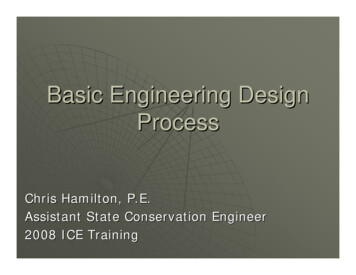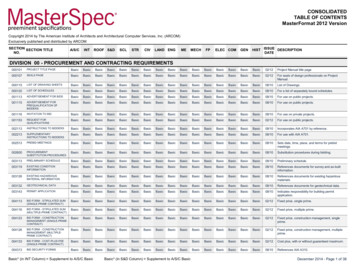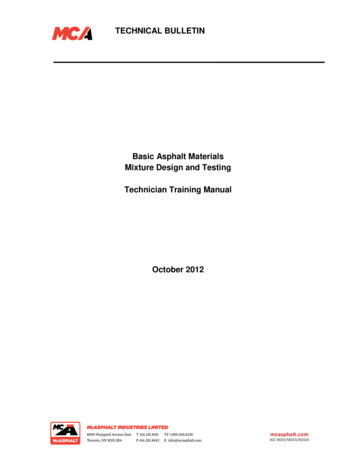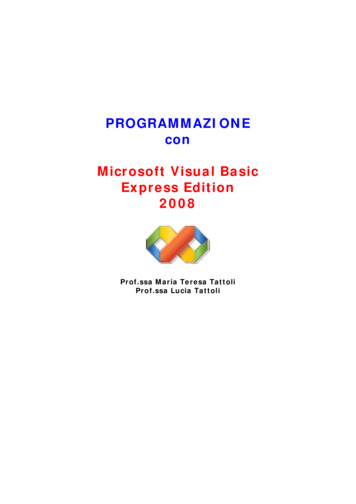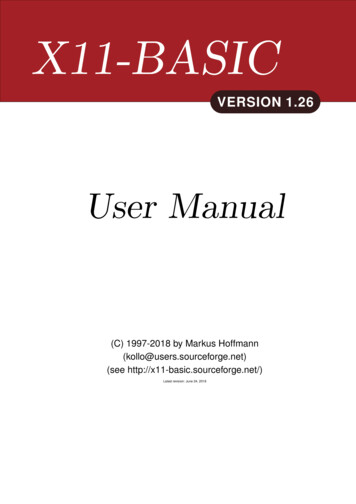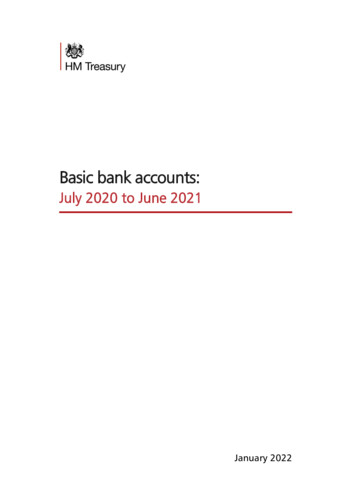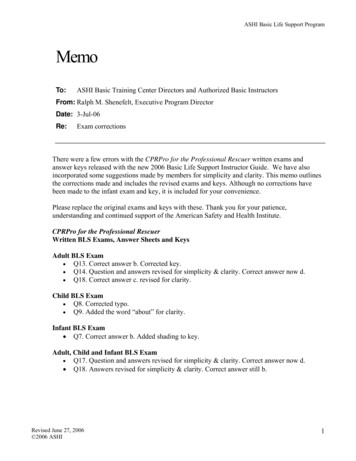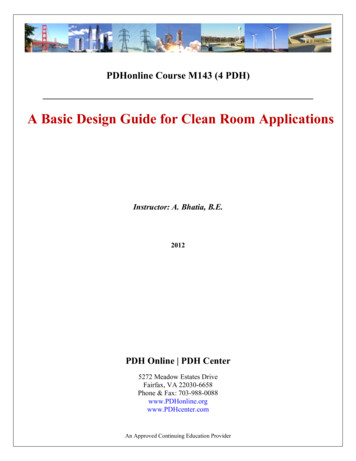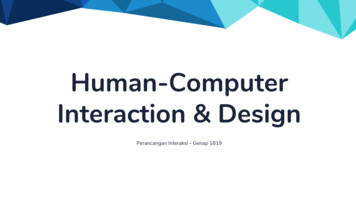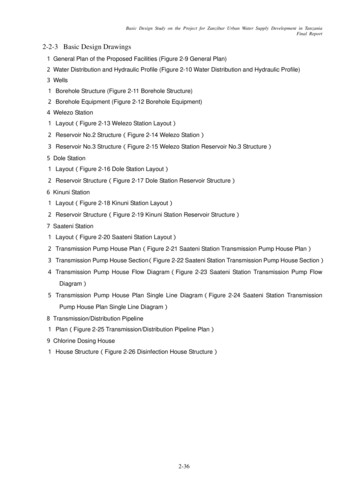
Transcription
Basic Design Study on the Project for Zanzibar Urban Water Supply Development in TanzaniaFinal Report2-2-3 Basic Design Drawings(1) General Plan of the Proposed Facilities (Figure 2-9 General Plan)(2) Water Distribution and Hydraulic Profile (Figure 2-10 Water Distribution and Hydraulic Profile)(3) Wells1) Borehole Structure (Figure 2-11 Borehole Structure)2) Borehole Equipment (Figure 2-12 Borehole Equipment)(4) Welezo Station1) Layout(Figure 2-13 Welezo Station Layout)2) Reservoir No.2 Structure(Figure 2-14 Welezo Station)3) Reservoir No.3 Structure(Figure 2-15 Welezo Station Reservoir No.3 Structure)(5) Dole Station1) Layout(Figure 2-16 Dole Station Layout)2) Reservoir Structure(Figure 2-17 Dole Station Reservoir Structure)(6) Kinuni Station1) Layout(Figure 2-18 Kinuni Station Layout)2) Reservoir Structure(Figure 2-19 Kinuni Station Reservoir Structure)(7) Saateni Station1) Layout(Figure 2-20 Saateni Station Layout)2) Transmission Pump House Plan(Figure 2-21 Saateni Station Transmission Pump House Plan)3) Transmission Pump House Section(Figure 2-22 Saateni Station Transmission Pump House Section)4) Transmission Pump House Flow Diagram(Figure 2-23 Saateni Station Transmission Pump FlowDiagram)5) Transmission Pump House Plan Single Line Diagram(Figure 2-24 Saateni Station TransmissionPump House Plan Single Line Diagram)(8) Transmission/Distribution Pipeline1) Plan(Figure 2-25 Transmission/Distribution Pipeline Plan)(9) Chlorine Dosing House1) House Structure(Figure 2-26 Disinfection House Structure)2-36
Basic Design Study on the Project for Zanzibar Urban Water Supply Development in TanzaniaFinal Report2-2-4 Implementation Plan2-2-4-1 Implementation PolicyImplementation agency of the project is Department of Water Development under the Ministry of Water,Construction, Energy and Lands of The Revolutionary Government of Zanzibar. Project Implementation Diagram isshown in Figure 2-27.Goernmenr of TanzaniaGovernment of JapanExchange of NotesEmbassy of JapanJICAMinistry of Water,Construction, Energy andLands, ZanzibarReportingDepartment of WaterDevelopmentConsultancyContractProject TeamLand AquisitionPower SupplyOther SupportConsultantsConstruction SupervisorsCounter PartsCounter plicationfor designApprovalContractorSite OfficeManager(Chief Engineer)Expatriate EngineerFigure 2-27Local EngineerProject Implementation DiagramThe project team to be organized in DWD will be in charge of the project implementation from the detailed designstage. The project team will be responsible for the following works:a.To represent DWD for the project implementationb.To liaise with and coordinate Zanzibar and Tanzania Government Agenciesc.To liaise with and coordinate the related external agencies such as UNDPd.To work as counter parts for consultants in designing and tenderinge.To secure manpower for additional survey and tests, if required.The selected Japanese Consultants will undertake detailed design, tendering, construction supervision, aiming forproject completion within the given time frame. Thus the consultants will dispatch a resident engineer who willsupervise construction works on behalf of DWD. The consultants will also dispatch borehole, civil, mechanical and2-55
Basic Design Study on the Project for Zanzibar Urban Water Supply Development in TanzaniaFinal Reportelectrical engineers for construction supervision.As the project consists of drilling works, civil works, plumbing works and mechanical/electrical works, it isconsidered appropriate that a Japanese civil contractor with experience in the similar construction works willundertake the works. The public bidding system will be used for selection of the contractor. The consultants, inconsultation with DWD, will prepare bidders’ qualification requirement and selection criteria for contractor.During the construction works, the Japanese contractor will dispatch resident engineers at site, and supervise andinstruct the local sub-contractors. The construction industry in Tanzania is well matured and the local constructioncompanies can work on this project as sub-contractors.2-2-4-2 Implementation ConditionsConstruction works include borehole drilling, reservoir construction, transmission/distribution pipe laying, andmechanical and electrical equipment renewal at the transmission pump house. Open space for a site office andstockyards is readily available around the Stone Town through DWD. The followings will require special attentionduring the construction works.・ Manual labour is readily available in Zanzibar, while skilled engineer, some construction materials and heavymachineries are to be procured in the mainland Tanzania.・ The average annual rainfall is 1,600 mm. They have rainfall every month. Days with more than 10 mm rainfall willbe regarded as off days for construction.・ Special construction method for renewal of transmission pumps will be selected to minimize disruption of watersupply.・ No ready mixed concrete is available in Zanzibar. Thus concrete will be mixed at the construction sites.・ Drilling, pump installation and test run will be done under the strict supervision of the Japanese engineers.・ Tanzania VAT will be waived for the construction works upon official applications.・ The proposed well sites have normal soil and sand in the surface layer, and limestone at the depth over 5 meters.The appropriate drilling machines will be selected for this condition. The limited construction period may makeprocurement of drilling machines difficult.・ All the proposed well sites are in the government owned lands. There are some private owned lands around thesites and confirm the land availability with DWD counter parts.・ Although this project does not require EIA, implementation plan shall give due consideration for the surroundingenvironment.2-2-4-3 Scope of WorksThe scope of works for both Japanese and Tanzania governments is shown in Table 2-27. The scope ofundertakings of Tanzania side has been discussed and accepted by the Tanzania Government, which follows theJapanese grant aid policy shown in Table 2-28.2-56
Basic Design Study on the Project for Zanzibar Urban Water Supply Development in TanzaniaFinal ReportTable 2-27Project Scope for Tanzania and Japanese GovernmentsItemWorksConstruction of new wells,reservoirs andtransmission/distributionpipelinesEquipment procurementCivil construction worksEquipment installationLand acquisitionFencingInstallation of Powertransmission linesObtaining constructionapprovalRemoval of the existingpipesDisposal of the posal of replacedroofing materialsRenewal of transmission pumpsTo be undertakenby Tanzania Gov.2-57To be undertakenJapanese Gov.
Basic Design Study on the Project for Zanzibar Urban Water Supply Development in TanzaniaFinal ReportTable 2-28No.12345678910111213Major Undertakings to be taken by Each GovernmentTo be covered by To be covered byGrant AidRecipient SideItemsTo secure landTo clear, level and reclaim the site when neededTo construct gates and fences in and around the siteTo construct the parking lotTo construct roads1) Within the site2) Outside the siteTo construct the buildingTo provide facilities for the distribution of electricity, water supply, drainage and otherincidental facilitiesElectricitya. The distributing line to the site1)b. The drop wiring and internal wiring within the sitec. The main circuit breaker and transformerWater Supply2) a. The city water distribution main to the siteb. The supply system within the siteDrainagea. The city drainage main (for storm sewer and others to the site)3)The drainage system (for toilet sewer, ordinary waste, storm drainage and others)b.within the siteGas Supply4) a. The city gas main to the siteb. The gas supply system within the siteTelephone SystemThe telephone trunk line to the main distribution frame/panel (MDF) for the5) a.buildingb. The MDF and the extension after the frame/panelFurniture and Equipment6) a. General furnitureb. Project equipmentTo bear the following commissions to the Japanese bank for banking service based upon theB/A1) Advising commission of A/P2) Payment commissionTo ensure unloading and customs clearance at port of disembarkation in recipient country1) Marine (Air) transportation of the products from Japan to the recipient2) Tax exemption and custom clearance of the products at the port of disembarkation3) Internal transportation from the port of disembarkation to the project siteTo accord Japanese nationals, whose service may be required in connection with the supplyof the products and the services under the verified contract, such facilities as may benecessary for their entry into the recipient country and stay therein for the performance oftheir workTo exempt Japanese nationals from customs duties, internal taxes and other fiscal levieswhich may be imposed in the recipient country with respect to the supply of the products andservices under the verified contactsTo maintain and use properly and effectively the facilities contracted and equipmentprovided under the GrantTo bear all the expenses, other than those to be borne by the Grant, necessary forconstruction of the facilities as well as for the transportation and installation of theequipmentRemarksB/A: Banking Arrangement, A/P: Authorization to Pay2-58 ( ) ( )
Basic Design Study on the Project for Zanzibar Urban Water Supply Development in TanzaniaFinal Report2-2-4-4 Consultant SupervisionAfter the completion of this basic design study, the project is subject to the GOJ cabinet approval of GOJ. Uponthe cabinet approval, Japanese and Tanzania Governments will sign the Exchange of Notes on grant aid for theproject.1) Detailed DesignBased on the Exchange of Notes, MWCEL will hire consultants for detailed design works for the project. After theGOJ verification of the detailed design contract, the consultants will perform detailed site survey and prepare detaileddesign, cost estimate and tender documents in Japan.2) Tendering and EvaluationAll the tender documents are subject to MWCEL approval. After the approval, the consultants will immediatelyproceed with tendering.a.To allow one week for bidders to prepare an application for prequalificationb.To evaluate prequalification submissions from the bidders immediatelyc.To allow one and half months for prequalified bidders to prepare bidding documents after providing tenderdocuments to each prequalified bidder.d.To recommend the lowest qualified bidder for MWCEL as a successful bidder and assist MWCEL in contractnegotiation.3) Construction SupervisionConstruction works include civil works, well drilling works, plumbing works, mechanical/electrical works.Besides a resident civil engineer, the consultants will dispatch, civil engineers for drilling, plumbing and structures,mechanical and electrical engineers to the construction site in a few occasions, as construction works requiressupervision by the above specialists. The consultants will hire local engineers to support their works.The resident engineer of the consultants will maintain close contact with DWD and the contractors throughout theproject implementation. The resident engineer will submit progress reports to the JICA Tanzania Office and to theJICA headquarters at the agreed interval.2-2-4-5 Procurement Plan1) The Countries of OriginsFor grant aid projects, the countries of origins are limited to Japan and the recipient country in principle. Materialsand equipment required for this project shall be procured in Tanzania as much as possible. Some items that are notavailable in Tanzania, or whose supply and price is not consistent in the local market will be procured in Japan or thethird countries with due consideration for cost effectiveness, ease of maintenance, and reliability of suppliers. Kenya,South Africa and EU will be considered for procuring locally unavailable items.a) Civil MaterialsCivil construction industry in Zanzibar is not matured and supply of civil materials such as sand, timber is notconsistent in regard to quality, quantity and delivery time. Reinforcing bars, cement, aggregate (sand and gravel) arereadily available in Tanzania mainland, so those civil materials will be procured within Tanzania.2-59
Basic Design Study on the Project for Zanzibar Urban Water Supply Development in TanzaniaFinal Reportb) Equipment for Transmission Pump StationThe existing transmission pumps are made in EU, which are regarded as reliable, serviceable and economical.Thus Japanese products will be compared to EU products.c) Equipment for WellsPVC casing and screens are made locally in Tanzania and has been used for most of the existing wells.Submersible pumps for wells are manufactured and imported by the EU companies.d) PipesPVC pipes and ductile iron pipes to be used in this project follow the standard specifications of JIS and ISO, thusthose pipes could be procured in any countries. PVC pipes are readily available in Tanzania. Ductile iron pipes areusually imported from Kenya, South Africa, and EU.e) Pickup TrucksMost of the operating trucks in Zanzibar are second hand Japanese cars and spare parts and mechanics are readilyavailable. Thus pickup trucks will be procured in Japan.Table 2-29CategoryProcurement PlanItemTanzaniaCivil MaterialsEquipment forTransmissionPump StationEquipment forwellsPipesTrucksCement, Aggregate,Bricks,Reinforcing bars:.Pump, ValveElectrical EquipmentCasingScreensSubmersible PumpsElectrical EquipmentExpected Country of OriginsThird CountriesJapanEU PVC PipesDuctile Iron PipesPickup Trucks2) Delivery and Storage of TrucksProcured pickup trucks will be delivered to and stored at DWD head quarters.2-2-4-6 Soft Component Plan(1) BackgroundDWD provides water supply to urban and rural areas of Zanzibar. DWD has 793 staff and provides water supplyto around 230 business customers and 34 thousand household customers and public faucet users. However, theycollect water charges from only business customers and do not collect from resident users. In addition, they chargewater tariff to only 6 customers based on consumption counted by an attached water meter. They charge flat rates toother customers. This project plans to supply water to around 80 thousand households, hotels, restaurants and otherindustry users. Presently, only 4 staff work on revenue collection and they must perform customer management,meter readings, billing and collectionmanually without standardized business process or guidelines.2-60
Basic Design Study on the Project for Zanzibar Urban Water Supply Development in TanzaniaFinal ReportZanzibar Water Supply Authority (ZWSA) will plan to be established based on the Water Policy and thisAuthority aim to provide water supply with a cost recovery policy. To achieve the objectives of this project, ZWSAshould recruit a sufficient number of qualified staff to carry out operations and maintenance work. However, severalproblems and issues exist regarding management skills for collect the necessary information to make effectiveanalysis of system operations. Therefore, strengthening senior management skills and knowledge with this projectssoft component program as well as doing a technical transfer of the total system is required.(2) ObjectivesThe objectives of this project is to provide safe and sustainable water supply to the people of Zanzibar Urban/Westdistricts with sufficient facility operation and management based on sound water supply business management. Thissoft component program will provide support for ZWASA to achieve the above project objectives by strengthening itsmanagement system, providing knowledge and technology for operation of the new facility, conducting publiceducation to involve people of Zanzibar as an active customer, and creating a sustainable business situation.(3) Outputs of Soft Component ProgrammeThis Soft Component Program will expect the following outputs:1) Engineering trainingThe proposed water supply system will be properly operated and maintained by the staff of ZWASA.2) Training for organizational strengtheningThe water supply system will be managed by the institutionally and financially healthy organization.3) Training for developing public education programmePeople of Zanzibar will have sufficient knowledge about drinking water and hygiene.People of Zanzibar will have the willingness to connect to the water supply system and pay water tariff.People of Zanzibar will have sufficient knowledge for water resource and water quality protection.(4) Expected Results and Evaluation CriteriaInstructors of the engineering training and management training will check the training results using the outputcolumns of Table 2-30 and evaluate trainees of their knowledge and understanding of transferred technology. Theinstructors for public education will evaluate and analyze the results of the questionnaire surveys distributed to theattendees and confirm the result of public education.(5) ActivitiesThe following activities will be conducted in this soft component programme.1) Engineering TrainingThe program will transfer the basic knowledge and technology for operation and maintenance of the proposedwater supply system including wells, water transmission/distribution network. Japanese engineering consultants willdevelop the operation and maintenance guideline as training material, will conduct basic training to understand thestructure and objectives of the proposed water supply system, and will conduct theoretical training and OJT with theproposed equipment/facilities. Main activities are as follows:Teach structure and objectives of the proposed water supply system including wells, reservoirs and water2-61
Basic Design Study on the Project for Zanzibar Urban Water Supply Development in TanzaniaFinal Reporttransmission/distribution facilities,Teach hydraulic capacity of each process unit, including wells, reservoirs and water transmission/ distributionsystems,Conduct O&M trainings on the water supply system depending on production capacity fluctuations.The Contractor/Supplier of equipment/facility will provide operation and maintenance manuals and conduct OJTtraining for each equipment/facility.2) Management TrainingManagement training aims to provide management knowledge to DWD staff, which is required for DWD tobecome a self-supporting water company. Japanese consultants will develop training manuals. The training will focuson developing problem finding skills through discussion among participants and problem solving skills.Teach necessary knowledge and techniques on organizational management including accounting and humanresources management and developmentTeach how to read management information using Management Information System (MIS) monthly reportTeach communication and leadership skills of organization management3) Training for Developing Public Education ProgrammeTeach how to organise workshops to promote mutual understanding of importance of public education forproper hygiene, roles and responsibilities of stakeholders with their mission, vision, objectives, target and issuesDiscuss possibility of cooperation and commitment for working together to public education of proper hygienePromote understanding of the present state of drinking water sources and sustainable use of water resources inZanzibarAnalyze questionnaire filled by the participants on the workshop and willingness for commitment in publiceducation. Ask willing participants to join promotional campaigns to be organised by ZWSA.Details of the Soft Component Plan are summarised in Table 2-31.(6) Implementation MethodsThis soft component program will be conducted by experienced Japanese consultants in a classroom training,exercise training, on-the-job training, field training and system development. As there are not sufficient engineeringexperts of water supply system in Zanzibar, Japanese consultants will be dispatched.The basic roles and responsibility of Japanese consultants are as follows:1) Basic Roles of Japanese Consultantsa) Chief consultant for soft componentSupervise implementation of the soft component programmePlan training programmePlan management staff staining programmePlan workshop and public education programs.2-62
Basic Design Study on the Project for Zanzibar Urban Water Supply Development in TanzaniaFinal Reportb) EngineersOperation and maintenance training on mechanical and electrical facilities.2) Training Style and Modulesa) Engineering trainingTarget: engineering and management staff of ZWASATraining: classroom training using the design documents, field training and OJT using new facilities.b) Management trainingTarget: managers of ZWASATraining Style: classroom training with exercise and discussionc) Training for developing public education programmeTarget: managers of ZWASA to organise workshops attended by stakeholders and people concerned aboutwater supply system in Zanzibar including Ministry of Health, Ministry of Water, Construction, Energy andLands, Ministry of State, Regional Administration and Local Government and/or Zanzibar Municipal Council,NGO, representative of water users (ex. managers of hotels and restaurants and residents)Training Style: workshop including presentation and discussion(7) ScheduleThe training for management should be conducted first, followed by the training for engineering staff. Asconstruction of the proposed water supply system will be completed at the beginning of the year 2008, preparation forthe management training will start in May 2007, and followed by the actual training from June 2007. The engineeringtraining, especially OTJ, may coincide with the completion of the first phase construction works. The workshop andpublic education should be started immediately after the management training; public education will be taken up byZWAS thereafter.(8) Outputs1) Engineering TrainingTraining plan, Training material, O&M guideline, Evaluation report by trainers2) Management TrainingManagement training plan, Training material, Evaluation report by trainers3) Training for Developing Public Education ProgrammeTraining material (Water supply and tariff system, water resources protection and sanitation education), Evaluationreport by trainee2-63
Basic Design Study on the Project for Zanzibar Urban Water Supply Development in TanzaniaFinal ReportTable 2-30 Modules of Soft ComponentModuleObjectives1. Engineering TrainingEngineering personnel of ZWASA canproperly operate and maintain theproposed water supply system based onthe understanding of structure and designobjective of each facility (wells, watertransmission/distribution pipe network)and can install the consumer flow meters.Expected OutputTrainees can do following activities:・ Understand structure of well, materials, intake watervolume, and allocation of wells facility.・ Understand diameter of pipe, pipe material and hydrauliccapacity.・ Understand function of chlorine facility.・ Find distribution and leakage volume of water in eachservice area.・ Plan the quantity of raw water intake to meet the waterdemand.・ Operate the well pumps dependent on the water demand.・ Operate the chemical feed facilities dependent on thewater demand and raw water quality.・ Distribute the required water amount into each servicearea.・ Understand the installation method of consumer flowmeter.・ Operate the tools for installation of consumer flow meter.2. Management TrainingManagement of ZWASA can manage theorganization, including financialmanagement (e.g. budget control andcost analysis) and human resourcesmanagement (e.g. personnel evaluation)using IT system based on the transferredmanagement knowledge.Trainees can do following activities:・ Make financial report and report to top management・ Understand how to control the budget and do budgetcontrol・ Understand how to analyze cost and do cost analysis forproper water tariff structure・ Manage human resources based on the labour laws, rulesand regulation for employee and other internal regulation・ Manage the activities of public relation, riskcommunication, public education and extension3. Training for developing public education programmeZWASA can organise workshops to・ Share the knowledge about public education andobtain from attendees the consensus andpromotion of hygienecommitment for the people of Zanzibar・ Acquire commitment of cooperation of public educationto understand the necessity of properabout proper hygiene, roles/importance of water supplyhygiene and the roles/ importance ofsystem and sewerage from the people of Zanzibar.water supply and sewerage2-64
Basic Design Study on the Project for Zanzibar Urban Water Supply Development in TanzaniaFinal ReportTable 2-31Activities1.Engineering Training・ Teach structure of the proposed watersupply system including wells, reservoirs,and transmission/distribution pipelines.・ Teach hydraulic capacity of wells andreservoirs.・ Conduct training on O&M fortransmission/distribution system, includingcontrol of transmission/distributionamount.Details of Soft Component ial,O&Mguideline,Evaluation bytrainersClassroom trainingusing detail designdrawings anddocuments.Field training onthe proposed watersupply systemOJT using newequipment/facilityWater engineerand distributionnetwork engineer(Japaneseconsultants)Target: engineeringstaff of ZWSAPreparation oftraining anddevelopment oftraining materials:1 Engineers x 0.5monthsTraining:1 Engineers x 1.5months2. Training for management: transfer management knowledge to management staff of ZWSAManagement Classroom training Japanese・ Teach knowledge and techniques fortraining plan,Consultantsmanaging the organizationTrainingTarget: ZWASA・ Teach accounting and financialmaterial,middlePreparation ofmanagement including cost analysis andEvaluation by management stafftraining andbudget controltrainersdevelopment of・ Teach human resources managementtraining materials:including recruiting, personnel evaluation1 Engineers x 1.0promotion, payment, incentives, humanmonthresources development, and motivation・ Teach operational management includingTraining:procurement, public education, water2 Engineers x 1.0supply system and risk managementmonth・ Teach public relations and riskcommunications・ Teach facilitation and mentoring・ Teach how to read information formanagement using MIS monthly report3. Training for Developing Public Education Programme for the People of ZanzibarClassroom training Japanese・ Teach how to organise workshop for public Trainingmaterial,Consultantseducation on water supply and hygieneEvaluationTarget:ZWSA・ Share knowledge about the presentreport bymanagement staffPreparation ofcondition of water resources and thetraineetraining andbenefits of proper hygienedevelopment of・ Teach necessary actions for sanitationtraining materials:improvement in Zanzibar.1 Engineers x 0.5monthsTraining:1 Engineers x 0.5months2-65Remarks
Basic Design Study on the Project for Zanzibar Urban Water Supply Development in TanzaniaFinal Report2-2-4-7 Implementation ScheduleTotal 9.5 months are required for detailed design and tendering (6.5 months and 3 months respectively), thus theproject could not be implemented as a single-fiscal-year project (implementation period up to 2 years). The projectwill be divided into 2 phases (2 single-year projects) with separate benefits will be brought in each phase. As therecipient country requested early implementation, 2 single-year projects approach is more appropriate than oneproject funded by the Japanese Government Bonds, whose approval process is expected to delay the project by onefiscal year.Table 2-32First PhasePhase Saateni Service Area・TransmissionPumps Renewal400m3/hr x 2200m3/hr x 2・DisinfectionEquipment Renewal・Roofing Renewalfor Pump HousePhasing of the ProjectSecond PhaseWelezo Service Area Dole Service AreaKinuni Service Area Pickup Trucks・Reservoir・Pickup TrucksConstruction4 Nos.34,000m x 2・Disinfection Facility・Well Constriction58.4m3/hr x 6・Transmission Pipesφ150〜600: 13.0km・Distribution Pipesφ300〜700: ion1,200m3 x 12,700m3 x 1・Disinfection Facility ・Disinfection Facility・Well Construction・Well Construction58.4m3/hr x3 (1 standby)58.4m3/hr x 2・Transmission Pipes・Transmission Pipesφ150〜200: 4.5kmφ150〜400: 6.5km・Distribution Pipes・Distribution Pipesφ300: 3.2kmφ400: 7.1km2-66
Basic Design Study on the Project for Zanzibar Urban Water Supply Development in TanzaniaFinal ReportFigure 2-28Project Implementation Schedule2-67
Basic Design Study on the Project for Zanzibar Urban Water Supply Development in TanzaniaFinal Report2-3 Obligation of Recipient CountryThe Tanzania Government and DWD will undertake the works described in Section 2-4-3 for the completion of theproject. Those works are listed below in details.a.Land AcquisitionReservoirs4New Wells11Transmission/Distribution Pipelinesb.c.FencingPower Lines forReservoirs4New Wells11New Wells11Reservoirs4(Welezo, Kinuni, Dole)d.Disposal of replaced existing pumps4 sets2-68
Basic Design Study on the Project for Zanzibar Urban Water Supply Development in TanzaniaFinal Report2-4 Project Operation PlanThe Government of Zanzibar has plans to establish ZWSA as an autonomous body for executing water policy anddraft acts that are submitted to the House of Representatives. Regardless whether ZWSA is established or not, thefollowing O&M staff increases are necessary for this projects operation and maintenance of the newly constructedfacilities.2-4-1 Organization Strengthening PlanTable 2-33shows a brief summary of support from UNDP including the strengthening capacity on revenuecollection supported, soft components of this projects and other suggested support from donor agencies. Detailsshown in Table 2-34 focus on recommendations and suggestions for present organizational situatio
1) Detailed Design Based on the Exchange of Notes, MWCEL will hire consultants for detailed design works for the project. After the GOJ verification of the detailed design contract, the consultants will perform detailed site survey and prepare detailed design, cost estimate and tender documents in Japan. . 2) Tendering and Evaluation
